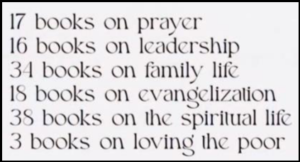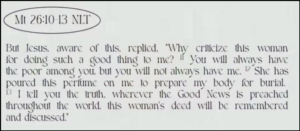 Talk
Talk
FULFILLED

TODAY, I want to preach the message, “Jesus wants your heart.”
The story we’re about to read is found in all four Gospels.
In Mathew, Mark, and Luke, the woman is unnamed. But in John, he names her Mary of Bethany, the sister of Martha and Lazarus.
Let’s read:

If there’s one thing you’ll learn from The Feast, it’s to read the Bible always in context. For the past 2,000 years, this story has been distorted beyond recognition, supporting this or that craziness.
For example? Some preachers used the words of Jesus, “You will always have the poor among you…” (v.11) to convince Christians to lessen the value of serving the poor vis-à-vis worship and evangelization.
They say, “Don’t focus too much on meeting the material and physical needs of people. It’s their spiritual needs that matters. Didn’t Jesus Himself say, ‘You will always have the poor among you?’ So, you can’t win, no matter what you do. It’s a losing game. But here’s where you can win: Focus on saving souls. Because that’s what will last…”
That thinking is garbage. Why?
First, we just read this story in Matthew. The core theme of Matthew’s Gospel is the upside-down Kingdom of Jesus, where the poor are God’s VIPs.

Second, the story follows the sheep-goats Judgment Day story– hands down, probably the most powerful teaching of Jesus on loving the poor. For crying out loud, loving the poor determines Kingdom entrance.
Third, the words of Jesus in the story were hyperlinked to the Torah…
Jesus Was a Rabbi
Jesus was a Jewish Rabbi. He taught like one.
When He said, “You will always have the poor among you…” (v.11) He was actually quoting an Old Testament verse. And since His Jewish audience knew their Bible by heart, as Rabbis do, He would routinely quote just a part of the verse to refer to the entire verse or passage.
Here’s the original text: There will always be poor people in the land.
Therefore, I command you to be openhanded toward your fellow Israelites who are poor and needy in your land. (Deuteronomy 15:11 NIV)
If you read the entire section, you’ll note it’s all about loving the poor.
So, when Jesus said, “You will always have the poor among you…” (v.11) He was NOT saying loving the poor was less important– or was useless. He was telling them the opposite: Love the poor!
Do We Really Get Jesus?
 Back in 2008, I already had a ton of books in my personal library.
Back in 2008, I already had a ton of books in my personal library.
So, I went through the titles and categorized them.
What I saw made my heart sink.
I discovered that I had 17 books on prayer, 16 books on leadership, 34 books on family life, 18 books on evangelization, 38 books on the spiritual life…
 But alas, only 3 books on loving the poor.
But alas, only 3 books on loving the poor.
I realized this spoke volumes of what we think it means to follow Jesus. Was this a mirror of what was important in my heart? But if you study the Bible, you’ll note 30% of it speaks about loving the poor.
Before we dive into our key passage, here are some practical steps:
 Before you give your money, give your heart.
Before you give your money, give your heart.
Spend time with those in need. Talk with them. Laugh with them.
Befriend the people in the periphery. People you don’t usually deal with. Believe me, at the very core, you’re the same: You’re God-carriers.
 Many of us and our kids live behind thick glass walls, separate from the suffering of society. Thus, we don’t see their hunger or feel their pain.
Many of us and our kids live behind thick glass walls, separate from the suffering of society. Thus, we don’t see their hunger or feel their pain.
But we should. So, I urge you:
 Insert into your calendar regular encounters with the poor.
Insert into your calendar regular encounters with the poor.
Go out of your way and meet Jesus in them.

Helping the needy shouldn’t just be a nice thing to do.
It must now be the purpose of your work. Set aside a portion of your monthly income as your Alms.
Today, I don’t have to work. My needs are met. But I keep working because I want to fund many more projects for the poor.
 Go to Jesus and pray, “How do You want me to serve You in the suffering?”
Go to Jesus and pray, “How do You want me to serve You in the suffering?”

Trust that He will give you a special assignment.
Perhaps He will point out specific suffering people around you— elderly neighbors, the security guard or janitor in your office, or sick relatives who have no one to care for them.
Perhaps it’s to serve in ministries for the suffering– such as our Anawim Home for Abandoned Elderly, or Jeremiah 33 Foundation for sexually abused girls, or Grace To Be Born for women in crisis, or our Light of Jesus Prison Ministry.
Perhaps it’s to build what I call “enlightened businesses” where employees share in the profits of the company as co-owners.
God will speak to you.
The Call of Extravagant Worship
 Let’s unpack our key passage verse by verse: Meanwhile, Jesus was in Bethany at the home of Simon, a man who had previously had leprosy.7 While he was eating, a woman came in with a beautiful alabaster jar of expensive perfume and poured it over his head. (v.6-7)
Let’s unpack our key passage verse by verse: Meanwhile, Jesus was in Bethany at the home of Simon, a man who had previously had leprosy.7 While he was eating, a woman came in with a beautiful alabaster jar of expensive perfume and poured it over his head. (v.6-7)
The cost of the perfume is spectacular! Mark’s Gospel gives its price: 300 denarii—a whole year’s worth of wages. If you translate this to modern Philippines, that’ll be P200,000. Wild, right? What is God trying to tell us here?
We think Worship is just about singing songs and lifting hands. While these are beautiful expressions of Worship, they are not Worship per se.
In the Bible, Worship has two elements: Obviously, there’s a price tag to doing those two mandates.
 Like Mary of Bethany, God is calling us to a life of extravagant Worship.
Like Mary of Bethany, God is calling us to a life of extravagant Worship.
To passionately give our BEST and ALL to Him.
And sometimes, you won’t get support…
People Won’t Understand You
The disciples were indignant when they saw this. “What a waste!” they said. 9 “It could have been sold for a high price and the money given to the poor.” (v.8-9)
Notice how Mary’s lavish love of Jesus made the people uncomfortable. The disciples themselves thought it was nuts.
Why? We’re giving our BEST and ALL to God.
If not, then maybe we’re not yet truly loving Him, following Him, and surrendering to Him.
About this, the apostle Paul says, “Beloved friends, what should be our proper response to God’s marvelous mercies? To surrender yourselves to God to be his sacred, living sacrifices. And live in holiness, experiencing all that delights his heart. For this becomes your genuine expression of worship.” (Romans 12:1 TPT)
 Was It Really Too Much?
Was It Really Too Much?
Let’s read the last part:

Jesus’ response to the disciples was very surprising. One would expect Jesus, a champion of the poor, to say to them, “That’s awesome. I love that you’re concerned for the needy.”
And turning to Mary, say, “The guys are right. This is way too much, Mary…”
Jesus doesn’t say that. Instead, He honors Mary. He commends her profuse act of devotion.
Obviously, Jesus is not saying He doesn’t care about the poor– as we mentioned in the first part of this Talk.
So, what was this about?
Here, we quote Fr. Blake Britton, priest of the Diocese of Orlando, Florida, author and speaker in areas such as millennial evangelization, video game, culture, sacred liturgy, and the Second Vatican Council…
Fr. Britton referred to Luke 10:38-42, the story of Mary and Martha, where Mary sits at the feet of Jesus preferring to listen to Him, rather than be busy serving Him, as Martha does.
Fr. Britton made a profound parallel between Mary’s sitting at Jesus’ feet and pouring perfume on Jesus’ head, both of which speak volumes of her devotion to the Lord: “Just as he used Mary to reveal the “better part” to her sister Martha in their village-home at Bethany, so now he uses Mary once again… to reveal the “better part” to his disciples and persecutors. The message is clear: To serve is right and good, but it must be preceded by sitting at the feet of Jesus. Mary recognized this; Judas did not.”
Not Just Your Hands…
Dear friend, Jesus wants your heart.
More than what comes from your hand, Jesus wants what comes from your heart. More than what you do, Jesus values why you do it for Him.
More than your work, God desires a relationship with you.
And out of a great relationship with God, comes good works.
It is our love for Christ that compels us to serve others.
 Pastor Chris Hodges, founder and senior pastor of the Church of the Highlands, Alabama, United States, said, “Nothing in Christianity will work if you’re not in love with God–following Him, serving Him, building the Church, making a difference…all that doesn’t work if you don’t love God. Nothing else can happen in Christianity without being in a love relationship with God. It all begins with “I’m in love.”
Pastor Chris Hodges, founder and senior pastor of the Church of the Highlands, Alabama, United States, said, “Nothing in Christianity will work if you’re not in love with God–following Him, serving Him, building the Church, making a difference…all that doesn’t work if you don’t love God. Nothing else can happen in Christianity without being in a love relationship with God. It all begins with “I’m in love.”
At this point, I talk to someone who still doesn’t know God. Not yet in a relationship with Him. If you’re such, now is the time to fall in love with Love Himself, and let that love change you.
You may already know of God, but never had a personal relationship with Him. Maybe you’ve gone to church all your life, did all the routines and requirements, but never experienced His real Presence through a relationship with Him. Now is the time to go deeper and truly encounter Him.
Some have known Him all their life, but their relationship with God has grown cold…
Have You Lost Your Passion?
 I talk to somebody in this dire situation…Maybe because of disappointments, dead dreams, and devastation in life, you’ve wandered away from Him and lost meaning in your life.
I talk to somebody in this dire situation…Maybe because of disappointments, dead dreams, and devastation in life, you’ve wandered away from Him and lost meaning in your life.
Friend, now is the time to reignite your passion for God, and with that, you also revive your passion for living. Jesus talked about this in the last book of the Bible where He said, “…you have abandoned the passionate love you had for me at the beginning.” (Revelations 2:4 TPT)
Paul says, “I want to know Christ and experience the mighty power that raised him from the dead.” (Philippians 3:10 NLT, emphasis mine)
The Greek word for know that Paul used here is Ginosko– which means to be in an intimate relationship with someone.
When we are in an intimate relationship with Jesus, Paul says we will experience the power of His resurrection. For us, everything else gets resurrected based on this love relationship with Jesus.
My friend, it’s time to fall in love with Jesus all over again.
How do we apply this truth in our everyday living?
‘Before You Do, I Call You To Be’
Each New Year, we make a long To-Do-List to fulfill our dreams.
You’re probably gung-ho to act on each one already. And that’s good!
We need to have a bias for action.
 I believe, however, God is telling us today: St. Thomas Aquinas once said, “Action flows from being.”
I believe, however, God is telling us today: St. Thomas Aquinas once said, “Action flows from being.”
Here’s another way of saying it: What we do must flow from who we are. That means every visible expression of your faith must flow from your intimate communion with God.
Are You Too Busy To Pray?
Paul scolds some members of the Church in Thessalonica: “We hear that some among you are idle and disruptive. They are not busy; they are busybodies.” (2 Thessalonians 3:11 NIV)
The Greek word Paul used for idle is ataktos, which literally means without proper order.
My interpretation: They neglected to commune with Christ, resulting in stale action, and a busyness that produced superficial results. Friend, how many of us have been obsessed with results, but we were running on empty of the spiritual fuel that comes from a life-giving relationship with Jesus?
Conclusion: Meet Jesus
In Evangelii Gaudium (The Joy of the Gospel), an apostolic exhortation by Pope Francis, he says, The joy of the Gospel fills the hearts and lives of all who encounter Jesus. Those who accept his offer of salvation are set free from sin, sorrow, inner emptiness, and loneliness. With Christ joy is constantly born anew. . . I invite all Christians, everywhere, at this very moment, to a renewed personal encounter with Jesus Christ, or at least an openness to letting Him encounter them; I ask all of you to do this unfailingly each day.
 So, at the start of the year, before we do, or act, or serve, God is inviting us to sit, like Mary of Bethany, in His Presence in Worship.
So, at the start of the year, before we do, or act, or serve, God is inviting us to sit, like Mary of Bethany, in His Presence in Worship.
Fall in love with Him again.
And let His love drive how you live this year for His glory.
Jesus wants your heart.
